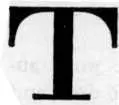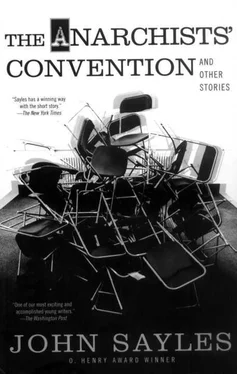"Fucker can ride," said Jim Crow.
"Fucker could always ride," said J.C. "Nobody ever denied that. Like he's born on horseback."
Bad Heart lay close to the line of the stallion's back, seemed to flow with its every muscle. With the day's blood staining his old tan Levi's and the scabby red-brown of the horse it was hard to tell where one began and the other left off.
"Yee-yeeheeeeeeeel"
Bad Heart circled the trailer a few more times before a couple of the young men commandeered jeeps and lit out after him. It was a good chase for a while, the jeeps having more speed but the little stallion being able to cut and turn quicker. They honked and flicked their lights and kept Bad Heart pinned in view of the trailer but couldn't land him till he tried to make the horse jump the streambed one time too many. It just pulled up short and ducked its head, sending him flying over, tumbling through the air till he hit halfway up the opposite bank.
The horse trotted off out of all the lights and Bad Heart lay wailing.
He was pretty scraped up when they got to him, one side of his face all skinned and his left leg bent crooked from midway up the thigh. He cursed as they made a splint from a rake handle, cursed as they carried him in on a blanket, cursed when they laid him out on the Murphy bed next to Honda Joe.
"Wait'll the fucker wakes up in the mornin," he kept saying while they tried to calm him down. "Gonna have a big surprise. Wait'll he wakes up. Big fuckin surprise."
Jackson found his Bowie knife tucked in Bad Heart's boot when they pulled it off. The knife was bloody up to the hilt.
Brian went out with J.C. and Jackson to see about the horse. Everyone had turned their headlights off so J.C. got his flashlight from the pickup. They walked out in the dark a bit and then they heard whuffing up ahead and J.C. shined at it.
The stallion held its head up high, eyes shining back amber in the beam, bridle dangling, chest and sides lathered and heaving. It stood and looked at them as Jackson whispered his way up and took the bridle.
J.C. came up and took the Bowie knife from Jackson. He cut the rope free from the stallion's tail. Brian went back with him to see what had been dragging behind.
It was a blood-sticky hide. The hair coarse and greasy, like something you'd scuff your feet clean on. It had a sad, lonely smell. It smelled like The West.
J.C. played the light off away from it. "I suppose we best take this thing over, break the news to old Sprague. You wanna come along for the ride?"
"Sure."
"Spose we'll call it a night after that. Get you up to go in the morning." He turned the flashlight on the stallion limping a bit as it followed Jackson toward the trailer. "There isn't all that much to do in Interior anyways."

HE MEXICANS TOOK Brian across the desert and over the mountains to the Coast in the black night. They sat in the front seat and spoke to each other in their language for the entire ride. Brian was relieved not to feel obligated to talk or to listen. Only the violent shaking of the old Comet kept him awake.
The Mexicans turned south when they hit ioi and Brian got out. The road was halfway down the western slope of a string of mountains. Trees blocked the view but he could hear the ocean in the distance. The Pacific. It was the warmest night he'd had on the trip; it would be easier to sleep out now and find his way to the water when it got light.
Brian started down through the woods, looking for a flat spot to lie, and stopped when he saw the word. It was barely visible over the treetops, glaring in blue neon. HAMBU. Brian spread his bag out and lay down. He had hitched a hard three thousand miles and in the morning he would be there. The hours of Spanish in the dark car, the steady ocean sound, the strange word in the sky — all made him feel like he was in a foreign country, an island in the South Seas maybe, or the coast of Africa.
"You can gain more knowledge in one crossing of the map," Brian's father used to say, eyes swimming in an earlyevening buzz, "than in four years at one of your so-called institutes of higher learning. Travel, travel is the greatest educator." The old man had missed the war, had made it over to Scranton once for a railworkers' convention and down to Atlantic City a few summers with the family. He did the rest of his traveling in front of the TV at the bar in the Hibernian. "When I was young I should have listened to my itchy feet," he'd say, "instead of another certain part of my anatomy. I chased the girls till your mother put salt on my tail, and then I wasn't a young man anymore."
Brian slept well, waking only to shift position in the bag, and whenever he sat up he could see the word shining in the night.
HAMBU.
The mountain blocked the rising sun but he woke automatically before dawn. It was cold; he hurried to dress and to get moving. The word was gone but the ocean sound was still there. He started down.
He saw telephone lines first, then broke into the open on a road. There was a drive-in hamburger stand under a huge sign. End of the word must have burned out.
The sun was up and casting long westward shadows by the time Brian walked down into the town. The streets were deserted, not even a delivery truck out, and the paper scattered everywhere made it even more forlorn. Election posters and handouts. Brian remembered that it was the day after. The faces of smiling candidates flapped around his sneakers as he walked. It was a small town with low, Spanishy architecture and all kinds of spiny green plants he had never seen before.
He came to a circular plaza and stopped to rest. There was a fountain statue in the center of it, surrounded by a highwalled moat. A pair of bronze-and-birdshit forty-niners panning for gold. The water wasn't running.
The moat walls came up to Brian's chest, the water still and clear. He could see coins shining up at him from the bottom, could see quarters and half-dollars among the pennies. He had a little over four dollars and one cinnamon doughnut left from his trip. There was no one around.
Brian took his jacket off and rolled up his sleeves. He pushed himself up and balanced at the pelvis on the edge of the wall, like he was on the parallel bars in gym. He bent down and dipped in as far as his arm would reach. The water was freezing cold, his hand didn't touch bottom.
He tied the strap of his duffel bag around his left leg for ballast, then swung his right over so that he was straddling the wall. He took his shirt off and leaned over sideways. Farther. The duffel bag was lifted clear off the ground and the water was up over his armpit and he still couldn't reach. The coins looked so near, looked like they were only a few feet below the surface. He gave one more effort and began to slip in, stopping himself only by digging in his nails and flailing with his wet arm. He managed to shift his balance back and flopped panting onto the street.
Brian put his shirt and jacket back on. He tossed a penny into the water and watched how long it took to hit bottom. The bottom of the moat went below the street level, the water was probably over his head inside. It was an illusion, the water magnified the coins so they looked closer. ETERNAL HOPE, said the plaque that lay at the forty-niners' feet.
The Pacific Ocean was green. He realized it was cold, late in the year and early in the day, but he had expected blues from the Pacific, pastel blues and turquoises and aquamarines like in the surfing movies or the picture of Balboa and the soldiers in his American History book.
"It's like nothing you've seen in your life," the old man used to say to Brian, shaking his head in wonder. "None of the freezing garbage-and-oil-fouled puddle you've got here, none of your miserable boardwalk rinky-tink. It's pure and clear and just slightly cool to the skin, breaking over the white-sand beaches of the Golden State. The mere sight of it could stop your heart with beauty," he'd say. "And the sun they've got, filling up the sky, toasting the air about you, that sun sets into it, warming your face as you look out over the water."
Читать дальше













